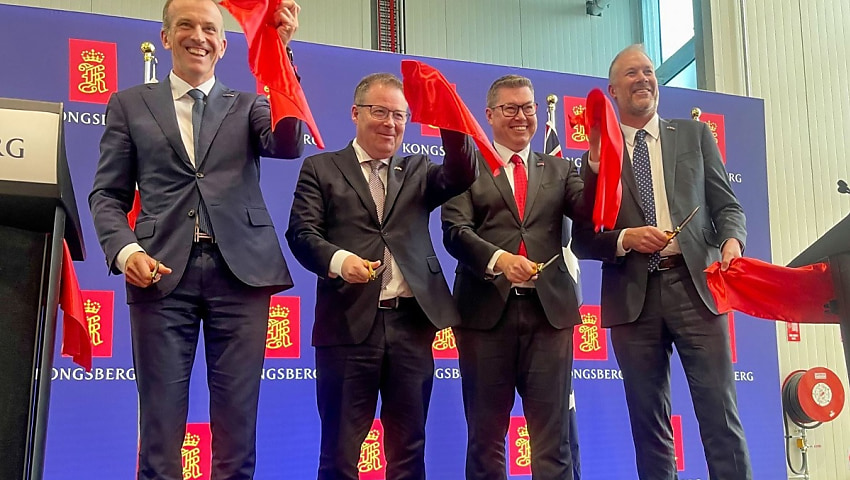Australian Deputy Prime Minister Richard Marles has applauded the addition of a “genuine strategic dimension” to relations following the first official visit by a Norwegian defence minister to Australia.
To continue reading the rest of this article, please log in.
Create free account to get unlimited news articles and more!
Norwegian Defence Minister Bjørn Arild Gram made the historic visit on 5 September for the opening of Kongsberg Defence Australia’s new facility in Adelaide alongside Australian Minister for Defence Industry Pat Conroy and Australia’s announcement of acquiring Kongsberg Defence & Aerospace-made JSM missiles for F-35 jets.
“In Canberra, Defence Minister met with Australia’s Deputy Prime Minister and Defence Minister Richard Marles and Assistant Minister for Foreign Affairs of Australia Tim Watts. The delegation, along with the Minister, also toured the Australian War Memorial and attended the Last Post ceremony with Air Marshal Leon Phillips OAM. The Minister also engaged in discussions on Australian defence strategy at the Australian Strategic Policy Institute,” the Royal Norwegian Embassy in Australia said in a public statement.
“Minister Gram emphasised the importance of defence cooperation with like-minded nations, noting Norway’s participation in the 2025 Talisman Sabre exercise. Norway is also strengthening its presence with a new defence counsellor (civilian) at the embassy in Canberra and a defence industry advisor. An important milestone for Norway–Australia defence collaboration.”
The Deputy Prime Minister and Minister for Defence Richard Marles said much of the improving relations with Norway could be attributed to industry encouragement led by majority-Norwegian government-owned defence manufacturer Kongsberg.
“Kongsberg is what’s opened the door and the fact that we are now working so closely with Kongsberg in terms of the development of our own Guided Weapons and Explosive Ordnance Enterprise,” the Deputy PM said, speaking to a media conference on 26 September.
“That Australia has decided to manufacture missiles in Australia, using Kongsberg as a strategic partner, that is really what has opened the door. But having opened the door, there is so much for us to do, so much for us to share.
“We have so much in common and so much alignment. I think it’s actually a really exciting moment between two countries who have always been very friendly, high levels of trust, but now have a genuine strategic dimension to the relationship.
“Kongsberg has a presence in Australia now, and it will be opening up a facility to manufacture both the Joint Strike Missile and the Naval Strike Missile in Australia.
“What I think that has done, it’s given a strategic dimension to the relationship between Australia and Norway. Obviously, we’re on other sides of the world but we share values, we share a great strategic alignment, we have a high level of trust and it’s really opening the door for a much greater engagement in our bilateral relationship.
“We’ve now met Bjorn a couple of times in the last month ... We will be looking at developing a strategic dialogue between Australia and Norway. We’re on other sides of the planet, but we have a lot in common.
“We both have large maritime areas that we need to ensure the rules-based order is maintained in, we have large maritime areas that we need to look at, surveil and patrol, we really have that in common.
“We obviously have in common our relationships with the United States and so there’s a lot to share in relation to that. We, in the Indo-Pacific, see a lot of the way in which China is shaping the world around it. Clearly, in Europe, there’s a view of how Russia is acting. And I think that enables us to have, in a really trusted space, a sharing of experiences.
“At a very kind of granular level, we will see Norway participating in Exercise Talisman Sabre, which is our major biennial exercise for the Australian Defence Force, that happens every two years. So next year is a year where we will do Talisman Sabre and Norway will be participating in that.
“The UK’s carrier strike group will be coming through the Indo-Pacific next year, Norway will have a participation in that as well. So at the level of exercises, we have engagement. But I think what we’ve discussed is that the opportunity for us to cooperate across space, cyber, obviously defence industry, intelligence sharing, really there’s a whole opportunity for us to do that.
“I was at NATO in Washington in July and one of the real themes of the most recent NATO meeting has been that there is such an interconnectedness between the Indo-Pacific on the one hand and the North Atlantic on the other … These two theatres are becoming increasingly interconnected.
“We find ourselves seeing great relevance in building the strategic relationships with European countries and Norway, specifically, as we started to look at each other, is a country where we have a lot in common. I mean, there’s a lot of similar challenges that Norway is facing which actually we’re facing as well, and I think we can work really closely together and learn from each other.”

 Login
Login







